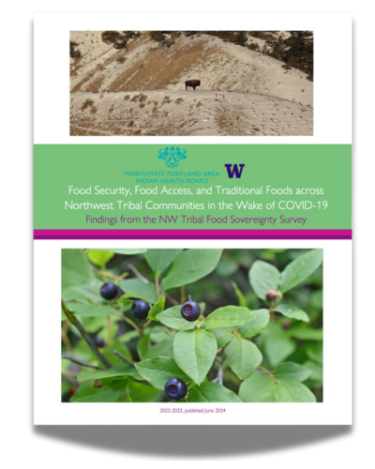NW Tribal Food Sovereignty Survey Report – Food Security, Food Access, and Traditional Foods across Northwest Tribal Communities in the Wake of COVID-19
Published June 24, 2024, this report shares findings from the NW Tribal Food Sovereignty Survey, the second wave research from a joint project between the Northwest Tribal Epidemiology Center (NWTEC), a division of the Northwest Portland Area Indian Health Board, and the University of Washington Food Systems, Nutrition, and Health team that aims to better understand the impacts of the COVID-19 pandemic on the wellbeing, food security, and access to traditional foods of PNW Native communities. The survey ran from August 2022 through May 2023 and was funded by the Indian Health Service.
Key Findings
The NW Tribal Food Sovereignty Survey (NWTRIBAL) received 165 responses from PNW residents identifying as a member or descendant of a tribe. About 62% of households responding experienced food insecurity in the 12 months prior to taking the survey. Use of food assistance was disproportionately high within tribal communities prior to the pandemic and rose significantly during the COVID-19 pandemic. Food assistance use has remained high, with 78% of NWTRIBAL respondents reporting using at least one food assistance program in the 12 months prior to taking the survey. More than 85% of those surveyed reported struggling with rising food and gas prices in the 12 months prior to taking the survey. When asked about their experience earlier in the pandemic, only a quarter of respondents reported struggling with these costs. Many reported difficulty accessing traditional foods and named many barriers as culprits, including decreased stocks and supply related to environmental factors, not knowing how to access, and limited opportunity to fish, hunt, or gather because of wildfires and smoke.
Despite reporting major barriers to engagement with traditional foods, 60% of NWTRIBAL respondents reported at least some engagement with traditional foods, with traditional berries, fish, and wild game among the most used. Traditional food use was higher among those living on reservation (74%) than those off reservation (51%). Respondents showed overwhelming interest in accessing more knowledge and resources related to traditional foods. Access to harvest grounds, tools, materials, and information to harvest, preserve, and prepare traditional foods were all of interest to about 80% of respondents. Many also expressed interest in having more information regarding the history and stories related to traditional foods. Some shared positive outcomes in the wake of the COVID-19 pandemic, naming increased access to food assistance, and having enough food to be able to share with others.
Explore More: Find all publications related to this study on the project page.
Materials
Publication Date: June 24, 2024
Author(s): The Northwest Tribal Food Sovereignty Survey (NWTRIBAL) was a joint effort between the Northwest Tribal Epidemiology Center (NWTEC), a division of the Northwest Portland Area Indian Health Board (NPAIHB), and the University of Washington (UW) Food Systems, Nutrition, and Health Program (FSNH). The team is comprised of Victoria Warren-Mears, Director, NWTEC; Shoshoni Walker, Food Sovereignty Initiatives Program Manager, NPAIHB; Luca Green, Tribal Food Systems VISTA Volunteer, NPAIHB; Jennifer J. Otten, Associate Professor in FSNH and Environmental and Occupational Health Sciences (DEOHS), University of Washington School of Public Health (UWSPH); Sofia G. Ayala, Research Scientist, UW Center for Studies in Demography and Ecology; Emilee Quinn, Former Research Scientist, FSNH, DEOHS, UWSPH; Alan Ismach, Research Coordinator, FSNH, DEOHS, UWSPH.
Resource Type(s): Reports
Research Area(s): Food Access, Food Systems & Nutrition, Social Determinants of Health
